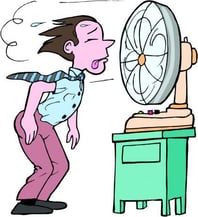 Between heat pumps, air conditioning units and mini-split heating systems, there are many options to cool your home this summer. Here are Warner Service’s advantages and disadvantages to all 3 possibilities:
Between heat pumps, air conditioning units and mini-split heating systems, there are many options to cool your home this summer. Here are Warner Service’s advantages and disadvantages to all 3 possibilities:
Heat Pump: These units operate by transferring warm and cool air. When warming the air, heat is brought in from the outside. When cooling the air, the heat is transferred out of the home.
Pros: Heat pumps cool and heat your home, so you can use it year round. It also relies on the natural climate, making it a more efficient option for your home since air is free. It could also nearly double the energy in heat than the energy it consumes to run, so it is eco-friendly. Heat pumps are known for being cleaner, quieter and odorless. They also have a low fire risk due to the lack of combustion.
Cons: If your home already has an energy-efficient way of heating, such as a high efficiency gas furnace, then a heat pump will not yield a high enough return on investment due to how pricey it is to install. The success of heat pumps depends on your home’s location. For example, these systems are not meant for extremely cold regions. Prolonged exposure to freezing temperatures will damage the unit and prevent it from operating at its full capacity.
A/C Unit: These systems absorb hear from the air that passes over the coil, and the resulting cool air is then moved into your house’s ducts and through your home.
Pros: Air conditioners will give your home a cool, comfortable environment in the summer with less upfront cost than a heat pump. They are also smaller and more compact, allowing the units to fit into tighter spaces. Newer models can improve your house’s cooling efficiency by up to 40 percent, saving you money on the energy bill.
Cons: Overly air conditioned environments can cause health problems, such as constant fatigue, dry skin, breathing issues and a higher susceptibility to the common cold and flu. Aside from physical consequences, improperly sized air conditioning units can cause your system to work harder or become damaged sooner, costing you more money in bills, repair or even replacements the long run. Larger units also tend to be noisier.
Ductless, mini-splits: A compressor or condenser is situated on the exterior of the home, while an air-handling unit is outfitted indoors. These components are linked by a conduit, which consists of a power cable, condensate drain, refrigerant, suction tubing and possibly an associated thermostat.
Pros: These units are small and flexible for zoning, which allows for easy cooling and heating of individual rooms. This will save energy costs associated with complicated ductwork and money, especially on power. Most of these units have a remote control to turn the system on and off when it is positioned high on a wall or suspended from a ceiling. These units are also quieter and easy to install.
Cons: Initial installation is typically more expensive than the above- mentioned options by about 30 percent. If a provider installs a system that is oversized or incorrectly located, this can result in short cycling, which wastes energy and does not provide temperature and humidity control. If your system needs repairs, parts are not easy to find. Aesthetic appeal is also a concern when installing these units. Some homeowners may desire a more built-in central unit.
Before you make your decision on which system to install in your home, consider price, environmental friendliness, noise, size and aesthetic appeal. When you are ready to install a unit, contact Warner Service today.

